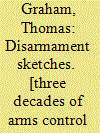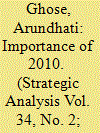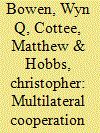|
|
|
Sort Order |
|
|
|
Items / Page
|
|
|
|
|
|
|
| Srl | Item |
| 1 |
ID:
046005


|
|
|
|
|
| Publication |
Seattle, University of Washington Press, 2002.
|
| Description |
xviii, 362p.
|
| Standard Number |
0295982128
|
|
|
|
|
|
|
|
|
|
|
|
Copies: C:1/I:0,R:0,Q:0
Circulation
| Accession# | Call# | Current Location | Status | Policy | Location |
| 047015 | 327.1740973/GRA 047015 | Main | On Shelf | General | |
|
|
|
|
| 2 |
ID:
094562


|
|
|
|
|
| Publication |
2010.
|
| Summary/Abstract |
In international relations, the more powerful have a way of underplaying history or overemphasising it, depending on how helpful or otherwise it may be in promoting their immediate objectives. It is interesting to note that even a country like India, which is beginning to sense the stirrings of power, is tending to fall into the same pattern. While this may be generally true, the expressions of power in the context of the non-proliferation of nuclear weapons, as becomes evident from an assessment of the five yearly Review Conferences of the Nuclear Non-Proliferation Treaty (NPT), have been more pronounced than perhaps in any other area of international relations.
|
|
|
|
|
|
|
|
|
|
|
|
|
|
|
|
| 3 |
ID:
116429


|
|
|
| 4 |
ID:
111917


|
|
|
|
|
| Publication |
2012.
|
| Summary/Abstract |
The second Nuclear Security Summit on 26-27 March 2012 in Seoul provides an important opportunity to gauge international consensus on the threat posed by nuclear terrorism, and to evaluate progress in the development of multilateral cooperative efforts to prevent it. However, the 'nuclear security' agenda has long been complicated by the complexity of the issues it covers and diverging perceptions of the risks and threats in this area. Further complications involve the politics that have constrained the development of formal cooperative approaches and the patchwork nature of the existing multilateral policy architecture. While the Summit is unlikely to go very far in mitigating these complications, it will nonetheless provide impetus to multilateral efforts to strengthen the international regulative framework in this area and, in the process, to develop the norm of nuclear security. Beyond Seoul several priorities stand out. Nuclear safety and nuclear security need to be approached in a more balanced way by the International Atomic Energy Agency, and it must also be allowed to adopt a more joined-up, and less stove-piped, approach to nuclear governance across the safeguards, safety and security fields. Developing countries that are concerned by growing demands for strengthened nuclear security arrangements need greater reassurance from those proposing them that these will not undermine their rights under the Nuclear Non-Proliferation Treaty to pursue civil applications of nuclear energy. Greater progress also needs to be made in universalizing the key nuclear security conventions and their amendments, and attention should be given to how momentum and high-level political buy-in to the nuclear security agenda can be maintained in the future both as part of, and beyond, the Nuclear Security Summit process.
|
|
|
|
|
|
|
|
|
|
|
|
|
|
|
|
| 5 |
ID:
094505


|
|
|
|
|
| Publication |
2010.
|
| Summary/Abstract |
In different international bodies and in statements by various world leaders, universalisation and a possible revision of the Nuclear Non-Proliferation Treaty (NPT) are figuring quite frequently. Certainly, in the emerging context for universalisation, the relationship between India and the NPT may be reviewed. Several relevant options are emerging to define the relationship between India and the NPT. This has put the relationship between India and the NPT in the international limelight. As no Indian government can ever be in a position to join the NPT as a non-nuclear weapon state (NNWS), the international community should adopt a realistic approach to bring India into the NPT. And this can only be as a nuclear weapon state (NWS).
|
|
|
|
|
|
|
|
|
|
|
|
|
|
|
|
| 6 |
ID:
094499


|
|
|
|
|
| Publication |
2010.
|
| Summary/Abstract |
Despite groundbreaking disarmament pledges and substantial effort, the Obama administration's hopes for a successful Nuclear Non-Proliferation Treaty (NPT) Review Conference may not be fully realised. Many developing countries are in no mood to grant new non-proliferation concessions, such as tightened rules on access to sensitive nuclear technologies, tougher inspection rules, or limits on withdrawing from the treaty. The non-nuclear weapon states (NNWS) remain angered by the failure to move forward on many disarmament commitments pledged at the 1995 and 2000 Conferences. Moreover, progress on disarmament measures under Obama has been slower than hoped, as he faces considerable scepticism in Washington about his strategy.
|
|
|
|
|
|
|
|
|
|
|
|
|
|
|
|
| 7 |
ID:
095071


|
|
|
|
|
| Publication |
2010.
|
| Summary/Abstract |
As the states parties to the nuclear Non-Proliferation Treaty (NPT) plan for the May 2010 review conference, they are faced with recurring political challenges that call into question the long-term sustainability of the presently constituted non-proliferation regime, notwithstanding the important role the NPT and its related institutions have played in slowing the pace of proliferation for four decades. Even if the review conference is deemed a success, its outcome is unlikely to address the regime's core structural weaknesses and normative contradictions. Frustration with the continuing status and benefits accorded to nuclear-armed states outside as well as within the NPT, will continue to diminish confidence in the effectiveness of traditional non-proliferation and deterrence practices. The progressive reframing of security in terms of creating a world without nuclear weapons may be little more than rhetoric for some leaders, but it has widespread public support. A growing number of governments are now expressing interest in new approaches and steps, including consideration of a nuclear weapons convention as a practical objective to work towards. The article discusses the challenges and options for the non-proliferation regime and concludes that efforts to halt future proliferation will increasingly focus on reshaping the norms and rules to pave the way for negotiating a new nuclear security compact, based on a verified process to prohibit and eliminate the possession as well as the use of nuclear weapons.
|
|
|
|
|
|
|
|
|
|
|
|
|
|
|
|
|
|
|
|
|